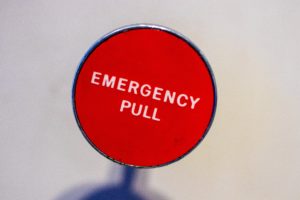Financial Emergencies…
What else can wreck a budget more than the unexpected?

Proverbs 22:3: “A prudent man foresees evil and hides, but the simple pass on and are punished.”
Financial Emergencies: Where do I Start?
What should we save for first? Proverbs 22:3 gives a good hint! It sounds like the prudent prepares for trouble. He knows that financial emergencies come from time to time and creates a covering for himself. You might say he creates an emergency fund. This perspective is only one of many this Scripture teaches, but we believe it is a valid one!
Nothing will wreck a budget like an unforeseen string of expenditures. The car breaks, the roof leaks and then we need to make an emergency trip to the vet. All legitimate emergencies. The thing that is so disruptive about unforeseen expenditures is that if we are unprepared they disrupt our peace and the whole ball of yarn begins to unravel, making it near impossible to ever become free of debt and prepare for the future.
If I can plan for it then it isn’t an emergency.
Let’s say a financial emergency arises. The first move is that the unforeseen expense goes into a future budget and we delay the expense if it at all possible. If we cannot delay the expense then we use our emergency fund. Immediately begin to replace the emergency fund after this incident passes. Either of these options moves the financial need out of crisis mode! BIG Score!
If we don’t have an emergency fund, then suddenly we are faced with needing to cover expenses for which we don’t have a plan. The difference in a crisis between having an emergency fund and not having one is the difference between it being a full-blown catastrophe and an inconvenience. Preparing for financial emergencies is not optional if you want to become and stay debt-free!
How can I afford to save?
Remember that line item in the budget mentioned earlier: “Pay Yourself Second”?
Let’s discuss our budgeting principle of paying yourself second. If you always wait until the end of the month to see if you can save what is left over, guess what, there will rarely be anything left over. Saving must be like anything else in life… intentional. To be a successful saver you’ll need to do so on purpose, it will not accidentally happen.
When you create your budget it is tempting to spend through the month on paper until everyone is paid and then wonder from where the savings will come. Remember the first two line items in your budget (see Creating a Budget). The first is God. We’ll talk more about giving on a different page. The second line item in your budget is you! That’s right; pay God first and pay yourself second. This is how you can set aside money each month for your financial goals (i.e. emergency fund). These two steps are key to your financial freedom!
You may be asking how much you should pay yourself. When you create your budget decide how much you will give (tithes and offerings) first. Then, create a line item for yourself but leave it blank until you finish the budget. When you are done, fill in the blank with the surplus. If there is nothing left or not as much as you desire, then squeeze or eliminate the items at the bottom of the budget until this second line item is greater than zero.
Budgeting this way will make you think harder about how often you eat out or shop for non-necessities when you realize every dollar you spend is one less dollar you will save. This forces you to choose between the accessories and necessities of budgeting and better prepare for financial emergencies.
Where do I keep the Emergency Fund?
This is not an investment! You won’t want to ride the roller coaster ride of the stock market with your emergency fund. This is a very boring piece of your financial life! Don’t use investments for this fund. A savings account or money market account will be just fine!
How Much Should I Save for Financial Emergencies?
Most financial advisors say that having three to six months of living expenses saved is a great target. Imagine knowing that you could survive financially for six months if you lost your job. We assure you that this will help you make a better employment decision. Not needing to take the first job that comes along after you are unemployed is a great position in which to be, not to mention the relief that will come should you have a financial emergency arise! This kind of emergency fund rounds out the foundation you are building.